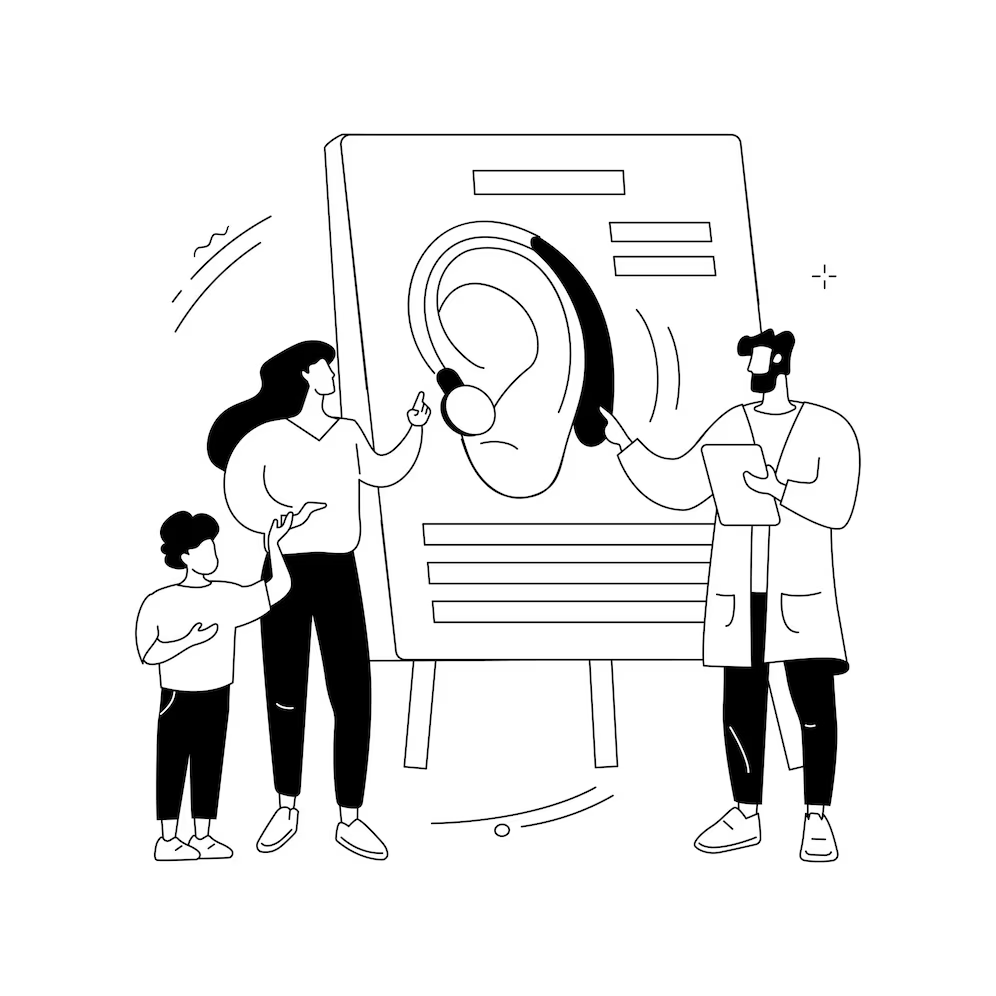Introduction:
Hearing aids are amazing tools that have changed the lives of millions of people who have trouble hearing. They bridge the gap between the world of sound and people who have trouble hearing by making sounds louder and making words clearer. How do hearing aids help you hear, though? In this piece, we'll talk about how hearing aids work, how they affect how people hear sounds, and how they help people who have trouble hearing.
Learn about hearing loss:
Before getting into how hearing aids work, it's important to understand what hearing loss is and how it happens. Hearing loss can be caused by a number of things, like getting older, being around a lot of noise, your genes, a medical condition, or even taking certain medicines. It usually makes it harder to hear sounds, either at certain frequencies or in terms of their total volume.
Hearing aids are made to help people with different kinds and levels of hearing loss by giving them personalized ways to hear sounds better and improve their overall hearing experience.
Hearing aids are made up of:
Let's look at the main parts of hearing aids to see how they help you hear:
The microphone is the part of a hearing aid that lets sound in. It listens to the sounds around it and changes them into electrical messages.
Amplifier: The microphone sends electrical data to the amplifier, which boosts their strength or amplitude. This process of amplifying the sound waves makes sure that they are loud enough for the wearer to hear.
Receiver (or Speaker): The electrical messages that have been amplified are then sent to the receiver, which is also called the speaker. The receiver turns the electrical data back into sound waves and sends them right into the ear canal.
Batteries: Hearing aids are powered by batteries, which give the parts the energy they need to work and keep the gadget running.
Controls and Settings: Many hearing aids have controls that can be changed by the user, such as the volume and the program. With these features, people can change their listening experience to fit their own wants and tastes.
Digital Processing Chip: A digital processing chip is often found in modern hearing aids. This chip looks at the sound patterns and changes them so that they work best for the person wearing them. It can make words clearer, cut down on background noise, and make listening feel more natural.
How hearing aids help you hear better:
Now let's look at how hearing aids help you hear by making it easier to understand sounds:
Sound Amplification: One of the main jobs of hearing aids is to make sounds louder. The microphone picks up sounds around you, and the amplifier amplifies them to make up for your hearing loss. This makes sure that things that were too quiet or hard to hear become louder and clearer.
Clarity of Speech: Hearing aids are made to focus on speech sounds, which makes it easier for people to understand talks. Modern digital processing algorithms can tell the difference between speech and background noise. This makes noisy surroundings less of a problem and improves the clarity of speech.
Frequency-Specific Amplification: When people lose their hearing, some frequencies tend to be harder to hear than others. Hearing aids can be set up to make louder certain frequencies that are hard for the person to hear. This makes sure that the user gets the best sound amplification where it is most needed.
Directional mics: Many hearing aids have directional microphones that focus on sounds coming from the front while reducing sounds coming from other directions. This makes the signal-to-noise ratio better, which makes it easier for people to understand words in noisy places.
Feedback Management: Hearing aids have systems to handle feedback sounds, like whistling, so they don't bother you as much. These systems look at the sound output in real time and make changes to stop feedback, which makes things more comfortable and improves the quality of the sound.
Adapting to the environment: Some hearing aids have features that instantly change the settings based on where the person is listening. For instance, they can tell if the person wearing them is in a quiet room or a noisy restaurant and change the volume and noise reduction settings accordingly.
Hearing aids can help:
Hearing aids help people who have trouble hearing in many ways, including:
Better Communication: Because hearing aids make sounds louder and speech clearer, they allow people to take part in conversations. This makes it easier for people to talk to each other and builds better relationships.
Hearing aids help people get back in touch with the world of sounds, so they can enjoy music, take part in social events, and enjoy the fullness of everyday life.
Increased Safety: Hearing aids help people hear important sounds in their environment, like alarms, sirens, or cars coming up behind them. This makes them safer and more aware of their surroundings.
Studies have shown that if hearing loss isn't handled, it can lead to a loss of mental ability. Hearing aids help stimulate the brain by making it easier to hear sounds. This may reduce the chance of cognitive decline and improve brain health.
Emotional Health: Losing your hearing can make you feel lonely, frustrated, and sad. Hearing aids can improve social well-being and mental health in general by making it easier to hear.
Conclusion:
Hearing aids are amazing pieces of technology that help people with hearing loss hear sounds better and live better lives. They connect people to the world of sound by amplifying sound, making words clearer, and letting people choose how they want to listen. Knowing how hearing aids work and what benefits they offer gives people the power to find the right answers and get back to fully participating in conversations, activities, and the everyday joys of life. If you or someone you know is having trouble hearing, talk to a hearing care professional to find out what your choices are and start a journey to rediscover the joy of sound.
Hearing aids are amazing tools that have changed the lives of millions of people who have trouble hearing. They bridge the gap between the world of sound and people who have trouble hearing by making sounds louder and making words clearer. How do hearing aids help you hear, though? In this piece, we'll talk about how hearing aids work, how they affect how people hear sounds, and how they help people who have trouble hearing.
Learn about hearing loss:
Before getting into how hearing aids work, it's important to understand what hearing loss is and how it happens. Hearing loss can be caused by a number of things, like getting older, being around a lot of noise, your genes, a medical condition, or even taking certain medicines. It usually makes it harder to hear sounds, either at certain frequencies or in terms of their total volume.
Hearing aids are made to help people with different kinds and levels of hearing loss by giving them personalized ways to hear sounds better and improve their overall hearing experience.
Hearing aids are made up of:
Let's look at the main parts of hearing aids to see how they help you hear:
The microphone is the part of a hearing aid that lets sound in. It listens to the sounds around it and changes them into electrical messages.
Amplifier: The microphone sends electrical data to the amplifier, which boosts their strength or amplitude. This process of amplifying the sound waves makes sure that they are loud enough for the wearer to hear.
Receiver (or Speaker): The electrical messages that have been amplified are then sent to the receiver, which is also called the speaker. The receiver turns the electrical data back into sound waves and sends them right into the ear canal.
Batteries: Hearing aids are powered by batteries, which give the parts the energy they need to work and keep the gadget running.
Controls and Settings: Many hearing aids have controls that can be changed by the user, such as the volume and the program. With these features, people can change their listening experience to fit their own wants and tastes.
Digital Processing Chip: A digital processing chip is often found in modern hearing aids. This chip looks at the sound patterns and changes them so that they work best for the person wearing them. It can make words clearer, cut down on background noise, and make listening feel more natural.
How hearing aids help you hear better:
Now let's look at how hearing aids help you hear by making it easier to understand sounds:
Sound Amplification: One of the main jobs of hearing aids is to make sounds louder. The microphone picks up sounds around you, and the amplifier amplifies them to make up for your hearing loss. This makes sure that things that were too quiet or hard to hear become louder and clearer.
Clarity of Speech: Hearing aids are made to focus on speech sounds, which makes it easier for people to understand talks. Modern digital processing algorithms can tell the difference between speech and background noise. This makes noisy surroundings less of a problem and improves the clarity of speech.
Frequency-Specific Amplification: When people lose their hearing, some frequencies tend to be harder to hear than others. Hearing aids can be set up to make louder certain frequencies that are hard for the person to hear. This makes sure that the user gets the best sound amplification where it is most needed.
Directional mics: Many hearing aids have directional microphones that focus on sounds coming from the front while reducing sounds coming from other directions. This makes the signal-to-noise ratio better, which makes it easier for people to understand words in noisy places.
Feedback Management: Hearing aids have systems to handle feedback sounds, like whistling, so they don't bother you as much. These systems look at the sound output in real time and make changes to stop feedback, which makes things more comfortable and improves the quality of the sound.
Adapting to the environment: Some hearing aids have features that instantly change the settings based on where the person is listening. For instance, they can tell if the person wearing them is in a quiet room or a noisy restaurant and change the volume and noise reduction settings accordingly.
Hearing aids can help:
Hearing aids help people who have trouble hearing in many ways, including:
Better Communication: Because hearing aids make sounds louder and speech clearer, they allow people to take part in conversations. This makes it easier for people to talk to each other and builds better relationships.
Hearing aids help people get back in touch with the world of sounds, so they can enjoy music, take part in social events, and enjoy the fullness of everyday life.
Increased Safety: Hearing aids help people hear important sounds in their environment, like alarms, sirens, or cars coming up behind them. This makes them safer and more aware of their surroundings.
Studies have shown that if hearing loss isn't handled, it can lead to a loss of mental ability. Hearing aids help stimulate the brain by making it easier to hear sounds. This may reduce the chance of cognitive decline and improve brain health.
Emotional Health: Losing your hearing can make you feel lonely, frustrated, and sad. Hearing aids can improve social well-being and mental health in general by making it easier to hear.
Conclusion:
Hearing aids are amazing pieces of technology that help people with hearing loss hear sounds better and live better lives. They connect people to the world of sound by amplifying sound, making words clearer, and letting people choose how they want to listen. Knowing how hearing aids work and what benefits they offer gives people the power to find the right answers and get back to fully participating in conversations, activities, and the everyday joys of life. If you or someone you know is having trouble hearing, talk to a hearing care professional to find out what your choices are and start a journey to rediscover the joy of sound.


